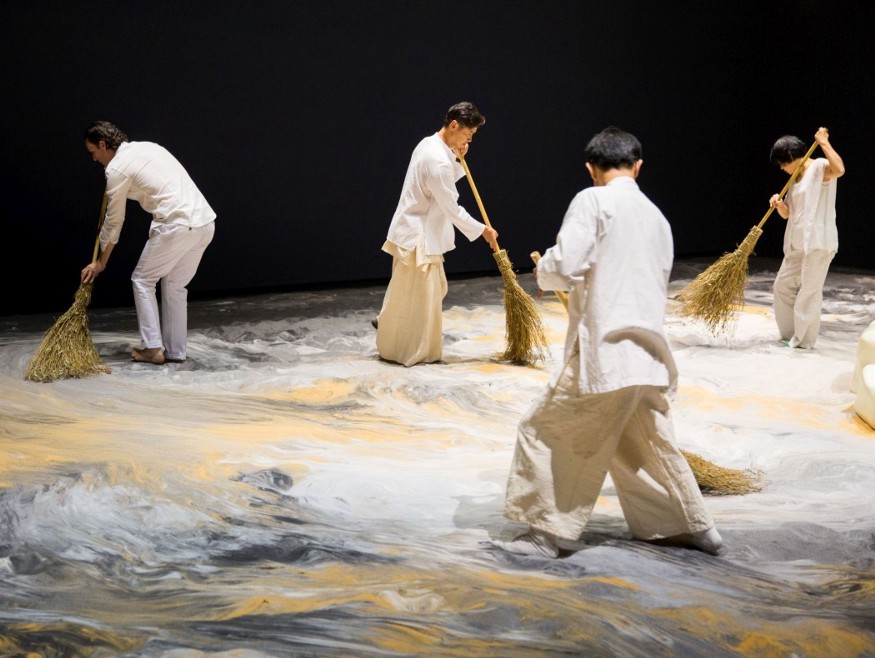Attention is Care
The act of noticing is the beginning of social change.

Last week I had a new experience which was actually a deja vu. I visited the same art exhibit twice within a few days: Lee Mingwei’s “禮 Li, Gifts and Rituals” in Berlin. The show features several in-person and digital performances, one of which, Sonic Blossom — a song received by one visitor the singer selects. In an interview, Mingwei explains his thinking behind Sonic Blossom and why for him a gift is always a ritual:
“One of the five virtues of Confucianism is li, which could be translated as ‘rite’, ‘ritual’ or ‘gift’. So when we say liwu, which means ‘the object of the rite’, it means we always prepare a gift when going anywhere. In Confucianism, the gift is a way of me gratefully saying, ‘thank you’. It’s not about what you can do for me in return. It’s the same with Sonic Blossom: the person who is offered the song has the right to say, ‘I don’t want a song to be sung for me,’ or they could openly receive a Schubert song. Usually, the gift is quickly reciprocated back to the singer and, within a few seconds, the singer is also emotionally moved — sometimes they can’t finish singing because the gift is returned in such a powerful way.”
Aside from the Schubert songs, the exhibition involves letter writing and rice raking, so it is constantly changing anyway, but regardless, I found it fascinating how much I had missed during my first visit. In fact, not only had I missed references and context, I had missed seeing entire rooms! It reminded me of my daily walk during the height of the corona lockdown when I noticed different things every time I went on the same route.
The act of noticing holds tremendous power, and it is true that, as L.M. Sacasas writes, citing Simone Weil, “Attention is the rarest and purest form of generosity.” He continues: “What is jeopardized when our capacity for attention is compromised and hijacked is not our ability to read through ‘War and Peace’ but rather our ability to care for ourselves, our neighbors, and our world as we should.” In his essay “Attention, Austerity, Freedom,” he draws parallels between our individual responsibility regarding the spread of COVID-19 and our individual responsibility as users of digital technology (with attention being our superpower).
Attention as a form of care is also a subject House Resident Mariana Lin, poet and former principal writer of Apple’s Siri, discussed in last week’s Living Room Session, “The Language of Pleasure.” She mused:
“What would happen in society if we each took better care of ourselves, before we even stepped out the door, before we spoke to another person? What would happen if we radically prioritized our own wellbeing and fed this vessel of senses that we are? What would happen even to our minds if our bodies were fed more fundamentally and given its deepest pleasures. We underestimate humans when we assume they respond to punishment over desire. I think punishment can bring temporary behavior change. But punishment ultimately shrinks us, whereas desire, especially desire for those things that feed us, expands us, and we continue to grow in it.”
Poetry, she suggested, is one such way of caring, about ourselves and others. It forces us to pay attention, to care, because “if you rush through it, you miss almost everything.” Poetry allows us to zoom in and zoom out at once. It is the rawest and yet most refined form of imagination.
The issue of collective imagination and whether it can enable belonging and a more inclusive future is a question Vanessa Mason of the Institute for the Future examines in her excellent overview of various recent contributions to this important conversation. At the House of Beautiful Business, we will explore moral imagination, social fictions, and new myths on day three of The Great Wave, our big virtual/in-person festival this fall.
Curating a session on imagination and collective action, I came across the work of social theorist Karen O’Brien and the quantum perspective on social change (and in particular climate change) she presents in her new book, You Matter More Than You Think. She pinpoints the frustration I have felt with the mechanistic worldview shaped by the scientific rationality of the enlightenment (the “age of reason”) for a long time:
“A focus on the purely functional connections between the different parts of the ‘machinery’ that drive our systems ignores deeper questions of meaning, purpose, and what really ‘matters.’”
O’Brien opens up a whole new realm of possibility by considering the entanglement of humans and (natural) systems and viewing “matter” not just as a physics concept: “Matter has agency.” This article provides a good entry point into her thinking.
How can we pay attention to what matters? How can we surf the new quantum age where everything is connected with everything and means at least two things at the same time? How can we take action, each of us personally, and yet dream big, using our collective imagination? How do we go with the flow and yet stand for something? And all of that in and through business?
These are exactly the questions we will explore with The Great Wave — join us!
***
This article was first published on the Journal of Beautiful Business.
Photo: Lee Mingwei, Guernica in Sand, 2006–present. Mixed media interactive installation, Sand, wooden island, lighting, 1300 x 643 cm; installation view Lee Mingwei and His Relations, Taipei Fine Arts Museum, 2015; courtesy: Taipei Fine Arts Museum